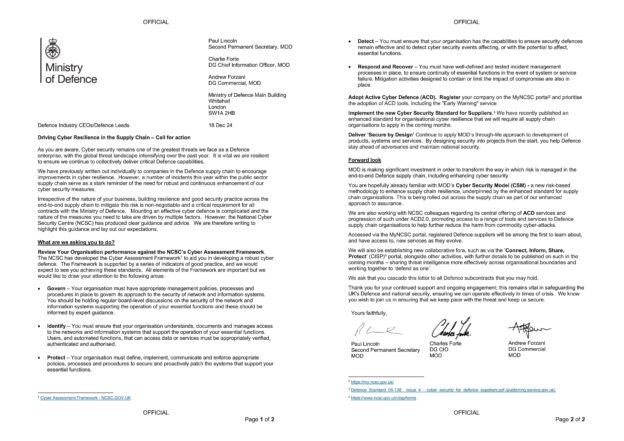The Ministry of Defence (MOD) has issued a call to action for Defence industry CEOs and Defence Leads, underlining the critical importance of enhancing cyber resilience across the Defence supply chain, “Letter from the Second Permanent Secretary, DG Chief Information Officer and DG Commercial to Defence industry CEOs/Defence Leads“. The letter, signed by Paul Lincoln, Second Permanent Secretary; Charles Forte, DG Chief Information Officer; and Andrew Forzani, DG Commercial, stresses the heightened global cyber threat landscape and the need for immediate and robust action to safeguard the UK’s Defence capabilities.
Contents
Key Actions and Recommendations
The MOD outlines the following priorities for Defence suppliers:
1. Review and Apply the Cyber Assessment Framework (CAF)
- Ensure robust governance with board-level discussions on cybersecurity.
- Manage and document access to critical systems.
- Implement proactive protection measures, including timely patching.
- Establish capabilities for detecting and responding to cybersecurity events.
- Develop and test incident management processes to ensure continuity.
2. Adopt Active Cyber Defence (ACD)
- Register on the MyNCSC portal.
- Use ACD tools, such as the “Early Warning” service.
3. Implement the Enhanced Cyber Security Standard for Suppliers
- Comply with the new standard aimed at strengthening organisational resilience.
4. Deliver ‘Secure by Design’ Solutions
- Embed security measures from project inception, ensuring a robust defence against adversaries.
5. Embrace the MOD Cyber Security Model (CSM)
- Adopt this risk-based approach as it rolls out across the supply chain.
6. Engage in Collaborative Fora
- Participate in initiatives like the CISP portal to share threat intelligence and collectively strengthen defences.
Some Thoughts
The MOD’s emphasis on cybersecurity is highly commendable, given the Defence Supply Chain’s vital role in national security. Building on this strong foundation, there are opportunities for further refinement and enhancement which will help underpin greater successes:
A. Practical Implementation Challenges
The Cyber Assessment Framework offers valuable and comprehensive guidance. For smaller suppliers, however, meeting compliance requirements could pose resource-related challenges. Offering additional support or introducing tiered requirements tailored to organisational size and role could make compliance more accessible.
B. Clarity on Compliance Timelines
The mention of upcoming requirements is a positive step. Providing specific timelines for compliance would help suppliers effectively prioritise and plan their efforts, ensuring a smoother implementation process.
C. Support for Adoption
Recommendations such as adopting ACD tools or registering on platforms like MyNCSC are excellent initiatives. That said, not all suppliers may have the necessary digital maturity to leverage these tools effectively. Providing training or onboarding support would encourage broader adoption across the supply chain.
D. Collaborative Fora Details
The concept of shared intelligence through platforms like CISP is particularly valuable. Further clarity on their operation, governance, and participation guidelines would ensure their full potential is realised and help all stakeholders derive greater benefits.
E. Supply Chain Dissemination
Having prime suppliers cascade requirements to subcontractors is practical but could benefit from additional oversight to mitigate potential compliance gaps. Enhanced monitoring mechanisms could strengthen this process.
F. Balancing Security with Innovation
The focus on security is crucial, and ensuring it complements innovation in Defence technology is equally important. Striking a balance would enable suppliers to remain agile and innovative while meeting the MOD’s security expectations.
Conclusion
The MOD’s proactive stance on cybersecurity is a necessary step to safeguard the Defence supply chain. However, the success of these initiatives will depend on clear communication, practical support, and collaborative engagement across all levels of the supply chain. As the industry works to meet these requirements, platforms like Cyber Tzar have a critical role to play in enabling organisations to manage and mitigate risk effectively.
